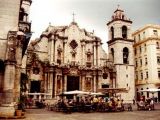The origins of the 'havanera' and the Spanish country dance
Most part of musicologists and researchers assure that the origins of the havanera must be traced on the Cuban Country dance, the criole country dance or the havanera dance, a kind of dance which descended from the Spanish country dance and which was introduced in Spain around 1701. Throughout the 18thC the country dance was brought from the metropoli to the colony by traders and businessmen, more or less seventy years earlier than the French country dance arrived to the Caribbean through the French colony of Haiti. The French country dance or contradance, mother of the Spanish one, had its origins in a much older English dance, the so called Country Dance, which had a great popularity in rural England in the 16thC and which, quickly spread all over the European continent with several rythmical and melodical variations. In France, the country dance, which derived towards the country dance, was introduced by the dancing teachers Isaac and Lorin into Louis XIV court, just after arriving from London in 1684 and in Spain, by the Borbon Felipe V, also of French origin.
In Cuba, the Spanish country dance came into contact with the indigenous music and the black music which was brought by the black African slaves. It was then when the ciolization or binarization of the Cuban country dance occurred. The characeristic beat of the Spanish country dance, 6/8, still present in some 19thC compositions, was binarized and substituted the third beat by the 2/4. In the island, blacks and Creoles started to speak Spanish and with the passage of time they even modified the accents and the intonation.
Therefore, in the island, the havanera was born like/as a ballroom dance, very popular among The Habana ballrooms. Later it splitted mainly because of melodic and rhythmical Spanish, African and Antillian influences into singing and dancing and later on, into just singing in most part of the musical theatre stages of the moment, into the lounge/ballroom version for voice and piano or among street musicians.

